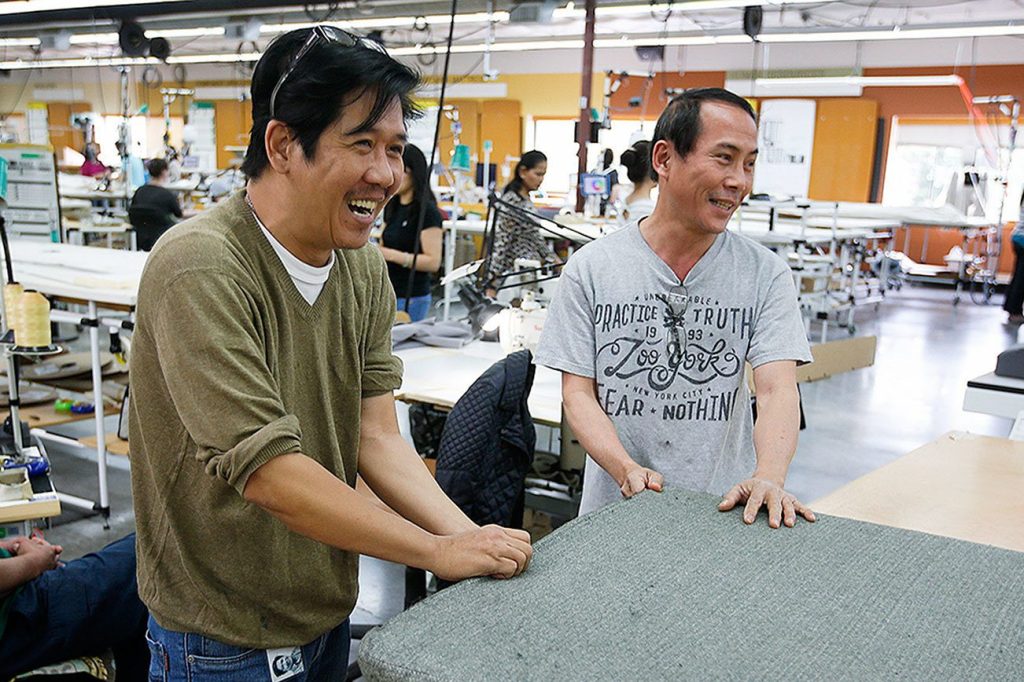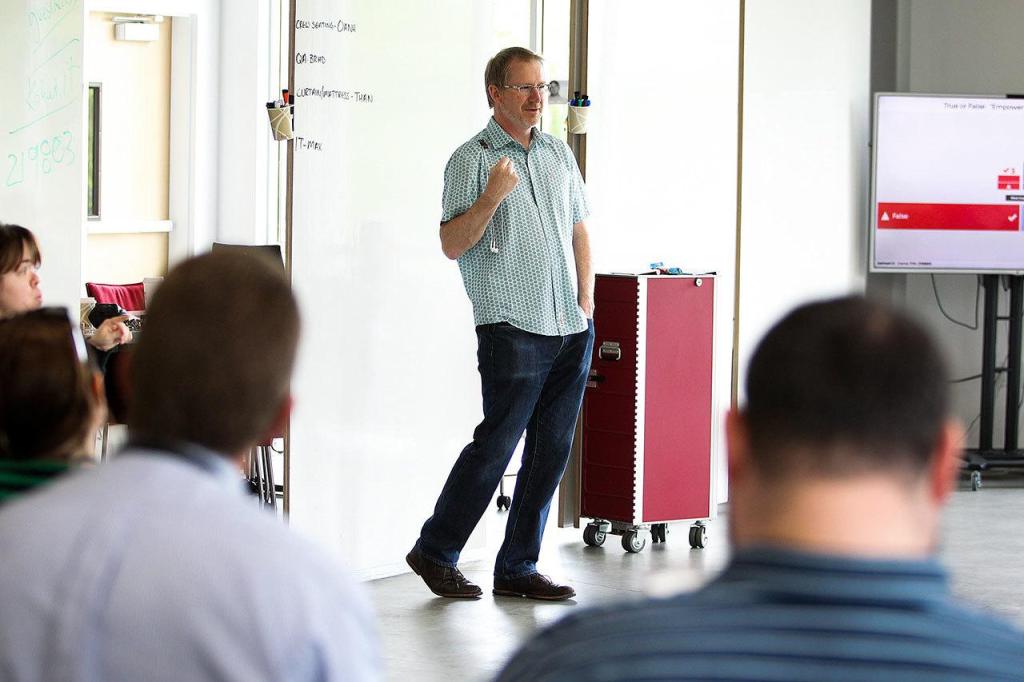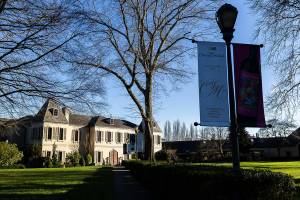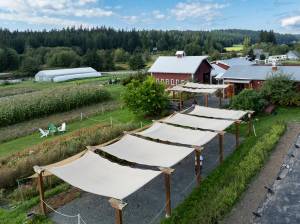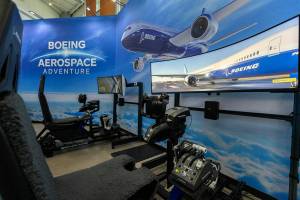Mukilteo’s Kaas Tailored learned from Boeing
Published 1:30 am Monday, July 25, 2016



Kaas Tailored owes its very existence to Boeing.
That’s what the owner of the Mukilteo furniture maker believes and it’s not just because Boeing is a client.
If not for the “Lean” philosophy Boeing adopted in the 1990s and encouraged in its suppliers, his company would probably not be around today, said Jeff Kaas, owner of Kaas Tailored, which supplies such products as porthole curtains and crew seats and mattresses for aircraft, including presidential and VIP planes.
“The big story is, ‘Lean’ got started in the Pacific Northwest because Boeing got it started,” Kaas said.
Kaas Tailored averages $20 million in sales a year, Kaas said. He estimated it saves 10 percent, or $2 million a year, by reducing waste through lean philosophy, or kaizen. With profits at just 5 or 6 percent, it’s hard to imagine the 200-employee company surviving without that waste reduction.
“And really, I think ultimately, there are people probably in Boeing who would agree that what has happened at Boeing as a result of this learning is why they’re still alive,” said Kaas, 48. “The 737 line is producing double what they thought was possible when I started my career.”
Call it lean, kaizen or continuous improvement, it’s a manufacturing method used by Toyota for decades. Boeing executives learned it by traveling to Japan and touring Toyota, then paid consultants to help train employees and suppliers.
What a lot of people don’t know is that Toyota developed its lean manufacturing method by studying American companies, Kaas said. It started when the United States sent consultants to Japan to revitalize its manufacturing industry after World War II.
Toyota representatives learned about production lines by visiting Ford Motor Company and from American supermarkets, they learned how inventory could be minimized by replenishing only what customers were buying.
A desire to build something of quality and to create a company that respects its employees and teaches other companies to do likewise seems as integral to Kaas as it does to Toyota and to kaizen. He learned about honor at his father’s knee, though his “love your neighbor” faith he learned on his own, he said, by reading the Bible and finding truth.
When he graduated college, it was natural for him to start working at his father’s company, then known as Kaasco Inc.
“I loved the idea of doing honorable work,” he said. “My dad was all about keeping his word. And I looked at what we were doing and at the time, he had already done work with Nordstrom and Boeing; and I really had a passion for building a family business and having something of lasting value.”
Today his wife, Stacey, and three of his four children work at Kaas Tailored. The company is all about family and treating employees like family, said Jay Peterson, aerospace product development lead, who started out 23 years ago. All through the recession, Kaas kept every employee who wanted to work.
“Nobody lost their job,” Peterson said. “He made sure that everybody had something to do.”
When Kaas’s father, Larry Kaas, started the company in 1974 with cousin Allan Kaas, they named it Kaasco International Inc., according to the Kaas Tailored website. It started in an old barracks building at Paine Field, Kaas said. When the cousins had a falling-out, his father re-formed and re-named the company Kaasco in 1980.
The Kaas company moved to a new building in Mukilteo in 1992 and, in 1997, his father retired and gave the company to him, Kaas said. By 2000, big-box store Costco was causing too much confusion with the Kaasco name, so he rebranded the company as Kaas Tailored.
(According to family lore, the Kaas name is itself a bit of a misnomer, having originally been Olson, or perhaps Olsen. But when his great-grandfather emigrated from Norway and settled in Ferndale, Kaas said, he discovered too many Olsons in the area and changed his name to Kaas, after a farm in Norway.)
In 1999, the Kaas company followed Boeing’s lead and took the first of its own study trips to Toyota in Japan.
All told, Kaas said he’s visited the factory a total of six times and has paid for a number of employees to make the trip over the years.
He’s traveled overseas to teach others about kaizen and has yet to charge a fee, or to ask for reimbursement for airfare or accommodations, he said.
It was while he was in Holland giving a kaizen talk a few years ago that he was approached by Dutch furniture company Design on Stock, he said.
A tour of the company’s factory led to a reciprocal tour in Mukilteo and the two companies realized they had much in common. Today, Kaas Tailored is the only American manufacturer of Design on Stock furniture, which is sold online and at one Arizona store and four Washington stores: McKinnon Furniture in both Bellevue and Seattle, Kaas Tailored’s Design on Stock factory showroom in Mukilteo and at Zinc Art + Object in Edmonds.
Design on Stock furniture is quality furniture made to last, Kaas said, “and we have a flat pricing model. The price is the price is the price. It doesn’t go on sale.”
For local businesses interested in learning lean philosophy, which he refers to as kaizen, Kaas leads tours of his company three days a week, 40 weeks a year, with a summer break. Tours last four hours and average up to 50 people, he said.
Goals of kaizen include reducing waste and inventory, spurring creative thinking and innovation in employees and achieving “one-piece flow,” a state in which everything is flowing smoothly on the production line.
Kaizen means employees are respected and given the power to stop the production line and make changes when needed, Kaas said. Stress is reduced to a minimum. At Kaas Tailored, employees are required to come up with 12 kaizens a year; this means they spot a problem, suggest an improvement and then carry out the improvement.
Seamstress Duy-Phuong Pham, who moved to the area six years ago from Vietnam, said she was having trouble reading a chart of sewing instructions for different projects.
She suggested that the instructions be color-coded and it was done, she said, proudly displaying a sheet of color-coded instructions.
While the old way of manufacturing was to create “batches” that were then passed on to the next work station, Kaas said, lean manufacturing concentrates on “bits” — completing the thing needed to ready the work for the next station. Work is started when orders are received and there is little-to-no extra inventory.
In a recent government order for 459 small curtains that can be snapped over a plane’s porthole-like windows, instead of completing the entire order, Kaas Tailored completed 15 curtains and waited to make sure there were no problems. As it happened, there was a problem — a snap failed. Project lead Jutta Claytor determined it was the fault of a too-long grommet shaft that bent when the snap was attached to the curtain.
Boeing engineers were called and fixed the problem. Had Kaas Tailored gone ahead and completed all the curtains, Claytor said it would have cost the company $114,750 in penalties — $250 a curtain — in addition to the cost of re-working the curtains.
Kaas named defects as one of the seven deadly wastes kaizen is meant to reduce. The others are overproduction, transportation, motion, waiting, processing and inventory.
“Overproduction is the most evil waste because it causes and hides all the other wastes,” he said.
Overproduction is often a result of decisions made in the corner office, Kaas said, and he worries that not enough companies touring Kaas Tailored send people with the power to make decisions. Teaching powerless employees about kaizen might actually hurt more than help.
“Most of our guests look at this and say, ‘This is so simple. Let’s do it.’” Kaas said. “Very few of them have the power to make that decision.”
As a result, he is currently rethinking how the tours are conducted and considering requiring the presence of more decision-makers from “frequent-flyer” companies.
As for future clients, Kaas said he is “very inspired” by the work Laura Zeck is doing at Edmonds’ Zinc Art + Object.
“And now what we’re doing is, we’re looking for Lauras,” he said. “We’re 100 percent sold on, ‘Let’s find cool people doing cool stuff who totally understand the future of retail.’ Meaning — small shop, high service, no overhead and true value in their community.”
It’s a small-business model that might not exist without Boeing. As Kaas said, “When you have great companies in your community like Boeing, small companies thrive.”

